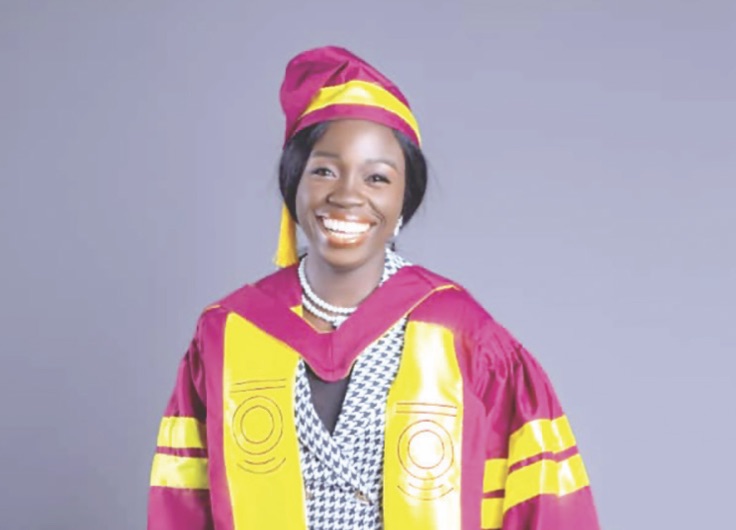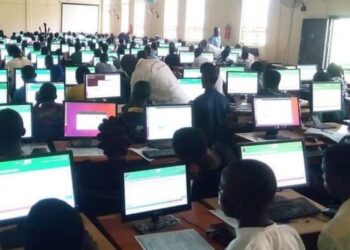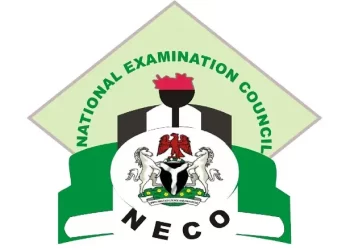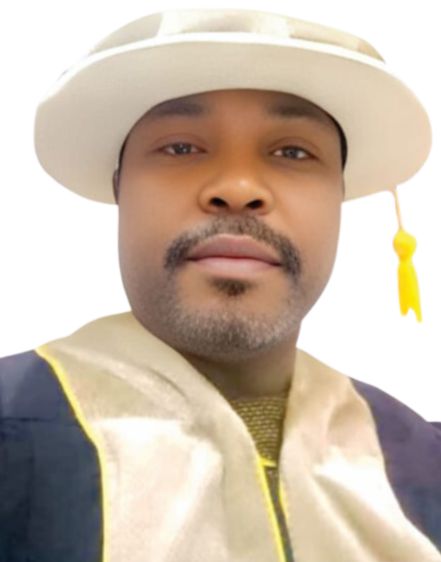A mother of two children, Mrs. Deborah Iwalola Johnson-Opeseitan, has obtained 5.0 Cumulative Grade Point Average (CGPA) from the Department of Zoology, University of Lagos, UNILAG, making it the best result in the history of the 61-year-old department.
Deputy Vice-Chancellor (Academics and Reasearch), Prof. Bola Oboh (left) and Dean, School Postgraduate Studies, Prof. Abraham Osinubi, presenting plaque to Johnson-Opeseitan.
A staff of the National Biotechnology Research and Development Agency (NBRDA), Johnson-Opeseitan got a mention in NBRDA bulletin by its Chief Executive Officer, Prof. Abdullahi Mustapha, for her feat: “I would like to congratulate one of us, Deborah Johnson-Opeseitan, who completed her master’s programme in Natural Resources Conservation at the University of Lagos with a CGPA of 5.0.
“This accomplishment is commendable. The commendation also comes with encouragement for her to utilise the knowledge for innovation, engaging in research that will contribute to the nation’s development and position NBRDA as a hub for technology.”
She spoke in an exclusive interview with Daily Sun.
Tell us about your academic journey from primary to university?
Thanks to my parents, who so much believe in education and see it as a key to success. My academic journey began from Love Foundation Nursery and Primary School, Iwo-road Ibadan, Oyo State, where I was the head girl before proceeding to St. Louis Girls Grammar School, Mokola, Ibadan, for my senior secondary school.
My parents have always wanted me to study Medicine and Surgery. But as fate would have it, and because my score in the Joint Admissions and Matriculation Board (JAMB) did not meet up with the MBBS requirements, I ended up studying Botany at the University of Ibadan (2004-2008). As a Botany student, the taxonomy of plant species and ethnobotany were my best courses. At least, if I can’t study Medicine, I should be able to identify medicinal plant species and know the use they can be put to.
I went for NYSC in 2009. Immediately I came back, I enrolled for my masters degree in Public Health (Epidemiology), the University of Ibadan. I performed excellently well, earned a PhD grade, and asked to proceed for my PhD. Marriage and children came in, I had to put everything on hold.
In 2020, COVID-19 happened. We had to stay back and work from home; 2021, ASUU strike that lingered for long happened. We had to stay at home. While at home, the idea of going for another master’s degree in Natural Resources Conservation surfaced. I pursued it with due diligence.
At what point did you realise, you would graduate with a perfect score?
All I was pursuing in UNILAG was to ensure I came out with a PhD. grade so I don’t have to do M.Phil before PhD. When my first semester results started coming in, the A’s were showing. I still did not believe all my results would be straight A’s because we had one very difficult Physiology course in semester that everyone was so scared of. But when the result came out, I had 71, which was just the perfect A I needed.
Are you the first MSc graduate in your department to obtain a CGPA of 5.00?
Yes. I had to ask my department Postgraduate Coordinator. He said I am the first person to have that kind of grade at master’s level in the department.
How did you cope with the MSc programme and managing the home front or work?
Combining Master’s programme, marriage, children and work were not easy tasks. At times, devoting time to attending classes early, Saturday classes, and coming back home late from school made some house chores suffer. But thank God for a supportive husband and my good boss at work who understood my predicament. They were always there for me.
What is the contribution of your MSc Thesis to knowledge?
My MSc thesis is about the distributional Ecology and abundance of Sclerophrys spp_and identifying threats to these bioresources and how they can be conserved. These threats were identified and solutions to how these biodiversity losses can be prevented are provided. Thereby encouraging safe and sustainable use of the bioresource. If the sustainable use of these bioresources is not considered, extinction is inevitable.
Was there a time you felt like abandoning the programme?
Yes. When I started the programme, the statistics part of it took its turn on me because it’s been long since I left school. Also, the programme took my time a great deal. It affected me helping the children with their assignments. So the burden was shifted to their lesson teacher.
Did you encounter any strike during the programme?
Yes. The long ASUU strike affected us at the beginning of the programme.
Was there any difference in your campus life during first degree and MSc?
Yes. During my undergraduate days at the University of Ibadan, I was single and had plenty friends. I could also sleep over in school to study. But for my master’s in UNILAG, I am always thinking of how to get back home to my children and husband after lectures everyday. I did not have all my time to myself.
Can you share your MSc experience with others preparing for such a programme?
Master’s in UNILAG is very challenging. If you must come out tops, you must be very diligent and put in the hard work. Attendance of seminars, punctuality in class, submitting assignments as at when due, surrounding yourself with like minds and staying true to yourself will take you to the top.
I will also like to use this opportunity to thank all my lecturers in the Zoology department especially those in the Natural Resources Conservation unit for grooming me and for being good mentors and teaching me to be a good steward of the environment and a good natural resource conservationist.
Who’s Deborah Iwalola Johnson-Opeseitan?
My name is Deborah Iwalola Johnson-Opeseitan. I am married to Oladipupo Johnson-Opeseitan and blessed with two beautiful girls. I am a native of Ondo State, Oka-Akoko town, to be precise. My parents are Mr. Ambrose Shittu and Mrs. Olusola Shittu. I am a principal research officer working with the National Biotechnology Research and Development Agency (NBRDA), a research agency under the Federal Ministry of Science and Technology.








